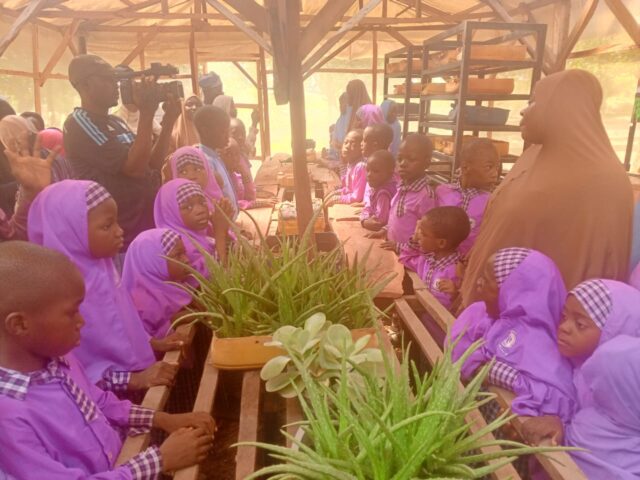‘…as Al-Bayyinah International School visits Maripha Farms.
The Nigerian Government has been urged to place food sovereignty first on its priority list to tackle not only the prevailing food crisis but some of the health challenges confronting the citizens.
President of Passion for Hope International, an African based Non Governmental Organisation, Brian Stephenson, said that exploiting the rich agricultural potentials remains one of the proven ways to strength the health sector by tackling the health challenges facing Nigerians and create a healthy living for them.
Stephenson, who is in Board of Directors, Maripha Farms, spoke while playing host to a group of students from Al-Bayyinah International School, on excursion to the farm.
He observed that majority of the food items Nigerians consume are imported, saying that this has continued to alter the healthy living of the people.
He stated that most of the diseases Nigerians are battling with are avoidable if only they could tap into the enormous agricultural potentials of the country and stop over dependence on foreign food.

“70% of food in Nigeria is imported and we can grow that by ourselves. We have the best climate and we need to let our children know that there is a future here.
“….Most of the diseases that we are experiencing in Africa are because we are eating the wrong food; chemically-dependent food”, he said.
He urged Nigerians to take advantage of the arable lands, favourable weather and conducive environment to ensure availability of food in the country.
He condemned the narrowed attention given to agriculture and over dependence on oil by the Nigerian leaders.
Instead, he explained that there is a need for more comprehensive strategy that gives people the right and decision to choose their food types, location of production and method of producing it.
“We have many jackets of oil and we got comfortable and we gave up on agriculture. It is time to come back and that’s what Maripha Farms is showing you.
“We are talking about food sovereignty where we control our food. It is not just getting any food but we control our food, not the imported food”, he explained.
A member of the Board of Maripha Farms, Olubunmi Abayomi Omotesho, added that the farm was established to promote and encourage healthy ways of life.
Omotesho also emphasised the need to boost food self-sufficiency locally to reduce over dependence on foreign food and also support farmers who are the facilitators of local food production.
“The foundation, Maripha Farms, is promoting a regenerative and sustainable agriculture which is supposed to be a traditional way of farming.
“Generally, in the advanced countries, when you go to supermarkets, you will see a special section for organic products, although they are usually more expensive because they are healthier.
“The whole essence is for us to be able to use what we took get what we need. We decided to go organic because it is easier and also cheaper for the farmers because they don’t have to spend so much on fertiliser or experience the harmful effects of using it. We all know that when you use too much of fertiliser, the soil becomes so acidic. He submitted.
The Director/CEO of Maripha Farms, Mariam Titilope Olorundare, who disclosed that the farm was established in the year 2020, said the major aim of its established was to sustain the old farming method.
“The kind of farming we practise is integrated/regenerative farming. That is the way our forefathers farmed. It is a farming system where our parents and grandparents that had farms went to nature. They didn’t know about inorganic products or chemicals. And you will equally discover that most of our forefathers’ farms were not mono-cropping. They had several things done on the same land. And that is what sustainable and regenerative agriculture is all about.
“If you have sustainable and regenerative agriculture, it means one sector of the farm fits into another and you can do so many things at the same time.
“Here for instance, we have goats, we have poultry, we have fish and we also have cows that come into the farms and just give us their poop as manure. Our parents had all of these things in the olden days. We, at Maripha Farms are also going back to natural farming”. She explained.











